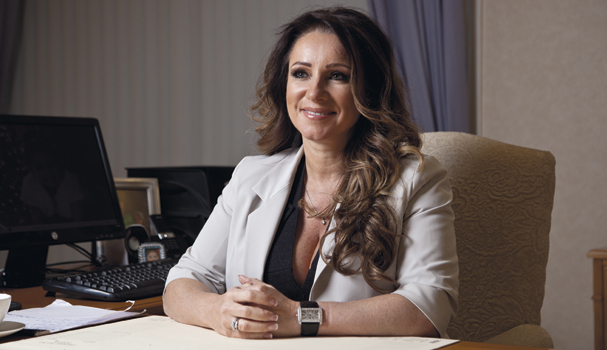At the age of 21, Jacqueline Gold attended a tupperware-style clothes party in an east London council flat. As she sat in the smoke-filled room drawing her husband’s meat and two veg on a piece of paper on top of her head, Gold and her fellow attendees were hit by a bolt of inspiration. “They said to me, ‘why don’t you do Ann Summers parties?’” recalls Gold.
At that time, Gold was doing work experience at her father’s company after having tried a plethora of other careers. From designing crosswords for 50p a time at the age of 13, she then tried her hand at hairdressing, bartending, waitressing and finally working in Royal Doulton’s china department. When the latter didn’t work out, she asked if she could do work experience at her father’s company, Ann Summers, a sex toy and lingerie brand with four stores and a small mail-order business.
“I had no intention of staying at the company,” says Gold. “It was a really male-dominated company then; the workforce was essentially men, the board was men, the customers were men. It was just a stop-gap.”
But once she had the lightbulb moment at the clothes party, she realised she would be sticking around a little longer than she’d originally intended. “The women at the party said ‘we would like to be able to buy sexy underwear’ and they wanted to spice up their sex lives, but needed to be on their terms. They didn’t want to have to go into a sex shop, which was the only place you could buy sexy underwear. On the high street it was all sensible knickers,” she laughs. Gold had a mission: she wanted to empower women in the bedroom.
She may have been the boss’s daughter, but there wasn’t so much as a sniff of nepotism. Gold, who was earning £45 a week, was told she’d have to present her idea to the all-male board. “I remember being really nervous and walking up this long corridor towards the boardroom,” says Gold. “One member turned to me and said, ‘this isn’t going to work, women aren’t even interested in sex,’” she recalls. “I remember thinking ‘that says more about your sex life than it does about my idea’. It was comments like that that just made me more determined because I knew it would definitely be successful – I knew I was on to something.”
The board thought she was too, despite a few initial misgivings. They agreed to invest £40,000 to get the idea off the ground, and Gold got to work recruiting party organisers. “I started off advertising in the London Evening Standard once a week. I’d drive to the Strand Palace Hotel in London in my mustard-coloured Mini and walk into a room full of people. I’d tell them about my idea, show them the kit, and then some people would leave the room, some people I’d have to ask to leave the room, and then I’d talk to those who were left,” says Gold. In less than a year, Ann Summers had 500 party planners up and down the country. “It grew so fast I had to stop advertising because we couldn’t keep pace with the teething problems. Then party planning pretty much took over the business.”
Indeed, the four existing Ann Summers shops were closed down, as was the mail order side of the business. The thriving party-planning division took centre stage until 1993 when the first new-look store was opened in Queensway, London. Gold says that while women embraced the reincarnation of Ann Summers, men were threatened by it. “Because they couldn’t go to the parties, the old-school men didn’t understand what it was about, and they remembered Ann Summers in the seventies, before my time, and remembered what it was like then. It was incredibly difficult trying to change some of their preconceived ideas.”

Gold says she was so focused on the task at hand that she “didn’t take it personally” when she faced criticism. Yet certain adversaries shouted so loudly it was impossible to ignore them. In 1999, there was fierce opposition to a proposed Ann Summers store in Dublin. “I had the Dublin Corporation on my back,” explains Gold. (Dublin City Council was known as the Dublin Corporation until 2002.) “In the end I invited them here because I wanted to demonstrate to them that we are a normal business and there aren’t women in PVC thigh-high boots walking around.”
Despite her best attempts, she wasn’t able to win them over. “At the end of the meeting they said: ‘look, we can’t be held responsible for you if you go ahead.’” Weeks later she was sent a bullet through the post. “I’m not saying for one minute that the bullet was anything to do with them, but they were right to warn me.”
Ann Summers had its fair share of critics in the Irish media too: coverage of the company was scathing. When she was offered the opportunity to go on Ireland’s enduringly popular Late Late Show she jumped at the chance to dispel many of the myths about her company. But when a member of the Dublin 18 Corporation stood up in the audience to “beat his chest” and criticise the risque retailer, Gold didn’t need to defend herself. “Women started standing up in the audience saying, ‘how dare you tell us where we can and can’t shop?’ There was loads of fantastic press the next day, all of the papers changed their opinion.”
It was hardly smooth sailing for the Dublin store, with a writ being served on the first day of trading – yet on the same day there were 10,000 people through the door. Ann Summers subsequently won its court battle to remain open in its current location and the Dublin branch is now a top-three performing store at the company. It’s also on the tourist bus route, a fact that clearly tickles Gold.
Whilst Gold’s relationship with the press has been largely supportive since her run-in with the Irish media at the end of the nineties, the constant interest in her life can be exhausting – particularly during times of personal turmoil. “You’re suddenly fair game,” she says. In 2009, Gold and husband Dan Cunningham were delighted when they discovered she was pregnant with twins. Then, 12 weeks into the pregnancy, the couple were struck the devastating blow that one baby wouldn’t survive the birth. “My husband really struggled to console me, it was just horrendous, and it was actually him that said to me, ‘Jac, I think you need to get back to work, you need normality back in your life.’”
Gold returned to Ann Summers HQ until her maternity leave. “I needed to be strong for my healthy baby. So I grieved for my little boy, although I didn’t know he was a little boy then. Then three weeks before the birth I was told he was going to be born alive, so that came as a massive shock to me because I’d conditioned myself that that wasn’t going to happen,” says Gold. Alfie tragically died at eight months old.
It’s impossible not to admire Gold’s strength and dignity, especially when she was confronted with abhorrent treatment at the hospital. “One of the nurses wrote about my son on Wikipedia,” she explains. “I didn’t know who it was, so I got a court order to track it down and found it was a nurse at the hospital. It’s disgusting. That was very painful. It wasn’t so much the media I found difficult as much as when people take advantage of the situation.”
Sadly, it wasn’t only during her son’s illness that Gold found her position as a successful businesswoman exploited. In December 2010, her nanny was charged with trying to poison her. “I understand once you’re in the media, it’s permanent, and I accept that. But others assume you’re fair game.” Yet, despite having faced the unimaginable, Gold refuses to let her past dictate her future. “Those were certainly difficult challenges, but I’m not a victim. I refuse to be considered a victim,” she says, stoically. “I just deal with it and move on. I’m not somebody that wants to allow that to shape who I am for the future.”

It goes without saying that Gold has a very special relationship with her daughter, Scarlett, who turns four in May. Whereas the entrepreneur admits to once working weekends, Saturday and Sunday are now “100% Scarlett time,” smiles Gold. “As soon as I walk in the door I put my mummy hat on and we just do nice stuff together.”
And when she’s at the office, Gold’s firmly got her CEO hat on. Under her stewardship, Ann Summers has gone from strength to strength, and now turns over £145m a year – annual revenues were just £83,000 when she joined in 1981. Thanks to its multi-channel strategy (Ann Summers sells via its high street stores, parties and online), the retailer has emerged from the economic downturn relatively unscathed – at a time many of its there weren’t a couple of store closures – the portfolio was 150 at its peak, it’s now 144 – and Gold hints a few more may be on the cards.
“Retailers generally are downsizing their portfolios and we may lose one or two more when the leases come up for review,” she says, quickly adding “that is normal – retailers are downsizing their portfolios.” The parties continue, but they are changing with the times too. “Parties are popular, but you’ve got the internet now, and we’ve got girls doing virtual parties. You’ve got to move with the times.”
Indeed, keeping up to speed with what customers want is the biggest challenge for a retailer like Ann Summers, and being first off the blocks to capitalise on any market trend is a must in order to gain competitive advantage. When 50 Shades of Grey, the populist erotic fiction, was released in the summer of 2011, Gold and her team had to move quickly. 19 “We totally sold out of handcuffs, jiggle balls and blindfolds,” says Gold. “I’m sure there will be another surge when the film comes out in 2015.”
Whilst the success of the book blindsided retailers, publishers and journalists alike, the Ann Summers CEO says entrepreneurs need to remain agile and fleet of foot if they are to take advantage of unexpected market trends. “You’ve got to have a crystal ball,” she says. “And then you need to make sure that you maximise every opportunity as much as you possibly can – because if you don’t, you can be sure somebody else will.”
The fact that Ann Summers first got wind of 50 Shades via Twitter comes as no surprise: the company leverages the social network better than some of the biggest of companies. And unlike many CEOs, Gold is a prolific and popular tweeter. “I started using Twitter a few years ago, terrified of doing my first tweet. I was a bit of a voyeur to begin with,” she admits. When she realised she had lots of followers who were fellow female business owners, she set up a weekly competition to find the best women-run businesses in Blighty. At first, entries trickled through, but now each week hundreds of women clamour to be recognised by Gold with winners adding the eye-catching #WOWwinner hashtag to their Twitter profiles.
For anyone who has met the amiable yet stoic business woman, it’s not hard to see why she has been elevated to a God-like status in the start-up and entrepreneurial community. Surely few can resist her warmth and openness, nor her grit and determination to succeed in the face of unbelievable adversity. Yet she is modest and graceful in the face of praise. “You don’t wake up one day and say ‘I’m going to be an inspiration for women’ or ‘I’m going to be a role model for women’. They select you.” There can’t be a much better validation of success than that. ![]()
Share via:

















































